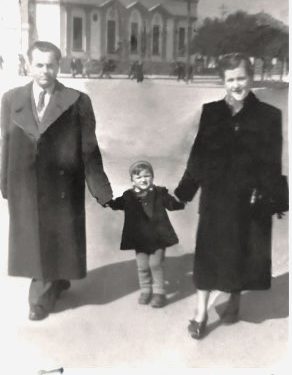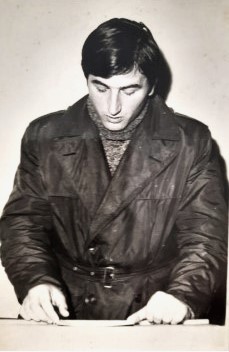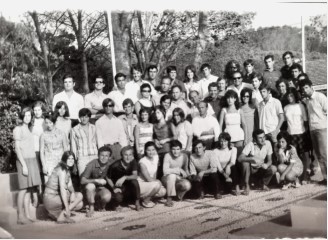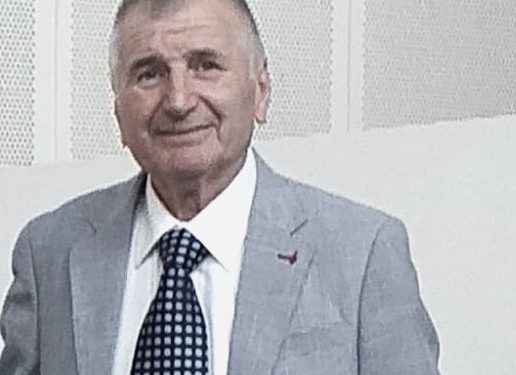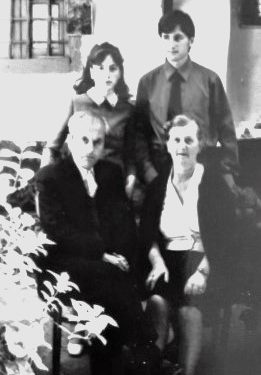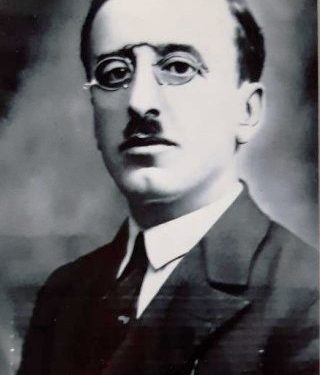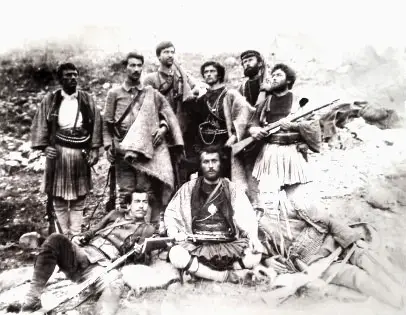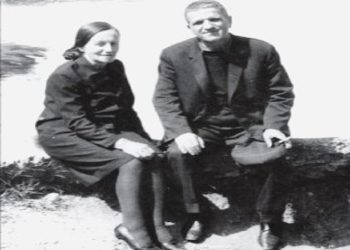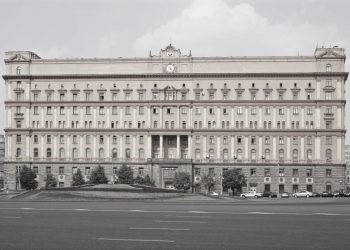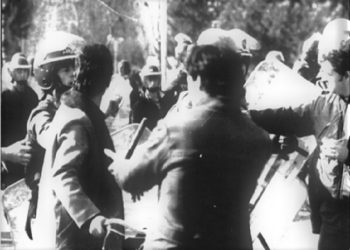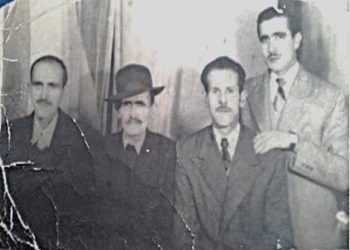By Nestor Topencharov
Part eleven
THE DRAMA OF LIFE
(THE STORY OF A FAMILY)
I dedicate this book to: All fellow sufferers. Their families. And in particular, to people who did not have the opportunity to tell the odyssey of life, during the communist dictatorship.
FOREWORD
Memorie.al / I were born in the city of Korça, on October 22, 1953. I left Albania in October 1990, after we were given the right to repatriate to Yugoslavia (now North Macedonia) . In June 1992, I immigrated to Italy, where I still live today. Although I have been away for 32 years, I did not cut ties, as Albania was the country of my birth, where I spent 37 years, and that part of my blood is Albanian. Years later, the ties with Albania were strengthened, as I also took my wife from Durrës. We came every year on vacation, but the short time of our stay meant that many contacts were cut off. However, true friends and comrades remained forever in my heart.
In the last three years, I did not have the opportunity to visit Albania. But during 2022, I came several times. My commitment on the one hand and the coincidence on the other, made it possible for me to re-establish connections with friends and colleagues whom I had not seen for decades. Knowing my past, some of them advised me to write down what had happened in my life. At first, this idea seemed like a utopia to me, since even though I had been a good student; I had no inclination towards drafting. Then I reflected. I would just write my story, true events, where not much inspiration was needed. Perhaps a writer would know how to present these events, as a true pen artist knows. While I will write them, without many descriptions: briefly, simply, naked, as they happened.
Something else that pushed me even more to write this book was an interview on TV Klan, which I saw in October of this year, directed by the well-known journalist Blendi Fevziu. I didn’t seek revenge. But I didn’t even have justice. With the help of this book, I will make known to the Albanian public opinion, the role of the individuals who contributed to my suffering and that of my family. And today, I am putting my finger on these “beings”, not for the task they had, but for the way they performed it. I will start my writing with my grandfather, from my mother’s side, to continue with my father, where I will touch on the most important moments of their lives. This will help the reader to know my background.
Then I will also talk about myself. In this book I will also tell some events, one more dramatic than the other, that happened to people I had the honor of knowing. I am glad that many books have been published on the suffering and persecution of “enemies of the people” and their families in internment camps and prisons during the communist dictatorship. I was able to read some of these works. I believe that this book, in a modest way, will contribute to know even more the inhumane methods of the State Security, the way they created accusations and how they destroyed people and families to keep the people under terror.
Author
December, 2022
Continues from last issue
CHAPTER THREE
On this subject, I remember what happened to another fellow sufferer. They ask him to appear at the Interior Department, where they propose to put him in the service of the State Security. He had accepted a provocative request.
He was ready to work for them, with one condition: “to dress” as a Security officer.
When they repeated the request, the answer was:
– “Officer, yes. Lightning, no”!
Not much time passed and the Security gave him the “clothing”, but not that of a Security officer, but that of a political prisoner.
The two money I earned helped me buy some food, to compensate for what they gave us, since for the hard work I did, it was insufficient. I sent the rest home. Once a month, the shop was opened, where I bought oil, flour, sugar, coffee, and who smoked, also packs of cigarettes, which served as a medium of exchange.
He used to help me cook. From time to time, I made pies, which my friends liked. We had an environment, a “private kitchen” we called it, where the fellow sufferers gathered on the basis of society, where they cooked something, which they shared together. One thing that impressed me the first few days when I went to Spac was the brewing of coffee. Someone invited me and after preparing the “mishela” in the gezve, he lit a sheet of rolled newspaper and when the flame reached the end of the newspaper, the coffee was ready.
In the fall of 1977, after a year and a half in the investigation, the father was sentenced for agitation and propaganda, with 10 years in prison and 5 years of electoral rights removal. The trial was held behind closed doors. First, because they wanted to avoid the people hearing the ridiculous accusations that would be made against them. Public opinion, at that time, had been prepared by the Security, that it would see a dangerous agent of the Yugoslavs. And the second, for the psychophysical health condition that they had created.
When, after the sentence, mom and Ivana went to meet dad at the railings of the Branch gate, he was unrecognizable. It was weakened. He could barely stand. His head was swollen and deformed. When he spoke a few words with difficulty, his voice came out differently and was not understood. When they separated, the sister was so shocked that she thought they had changed her father.
After 18 months of investigation and quick punishment, for agitation and propaganda, the father is sent to the Ballshi camp. His health had been destroyed; the depression did not give him the opportunity to take care of himself. Reshat Leska, Irakli Koçollari and their friends had done their job well.
I knew those investigators myself. I had experienced their cruelty on my back and felt humiliated once again, for what they had done to my father. My sister told me that when they came to meet him in the Ballsh camp, my father was always accompanied by a fellow sufferer who helped him.
For a long time, he was helped by a gentleman from Berat, originally from Korça, Spiro Pisha. I am forever grateful to this man and all the others for what they did for my father. What the competent bodies did not allow me.
After a year in Spaç, I approached the Directorate of Prisons, the Ministry of Justice and the Ministry of the Interior, to give me the opportunity to join my father in the ward that they considered reasonable, in order to take care of him. . No one bothered to give me an answer.
I told my sister that it was enough for them to come to me once a year and that I didn’t need anything. They came to my father more often and, if possible, helped him with food, as they had told me that in Ballsh, the food was very bad. But even for my family in Korça, it was not easy, and not only in economic terms.
The director of the Palace of Culture of Korça, Vangjo Vangjeli, had organized a meeting in the neighborhood, where he proposed the deportation of the mother and sister. But he did not achieve this goal. As it seems, State Security did not plan deportation for them. So the initiative of this bad man failed. As I mentioned above, at first when I went to Spac, I didn’t know anyone.
Then I met Tom. One of the brothers, Foto Proko, had studied journalism in the Soviet Union. When relations with them were broken, the wife and daughter remained in Moscow, while Fotua remained in Tirana. Then they exiled him to the island of Zvrnec, near Vlora. Among others, there were also his friends, Vangjel Lezho and Fadil Kokomani.
These co-sufferers, as is known, were then convicted and brought to Spac, where years later, the dictatorship met a tragic end. The mother’s sufferings for this exiled son created in Tom a hatred for the tyrant. Not only that. He started to react. First, he threw paint on the large portrait of the dictator, displayed in the center of the city.
Then he wrote and distributed the slogan. He did these actions in the early hours of the morning. After many searches, they caught him and accused him of agitation and propaganda. For this he was sentenced to 10 years. He was conscious of what he had done. The hatred towards the dictator had been very strong for him.
Free, Tom worked as a lathe. Even in Spaç, he worked as a lathe. He told me that he did a lot of personal work on the lathe, not only for police officers, but also for officers. In short, they needed it. Through him, I was once able to meet Ivana’s mother for half an hour, in a meeting room. It was the first and the last, as all other meetings were held at the bars of the outer gate, for only 15 minutes.
Those who worked had little free time. Work and sleep took up most of the 24 hours. Then dining meals, the appeal, reading Enver’s works, doing some laundry and some cooking in the private kitchen. Since we had a small library there, I thought I would read some literature in the little time I had left. At that time, there was a minority, Grigori, in charge of this library.
He could have been a year older than me. I ask him for a book to take with him. He came closer, told me to choose whomever I wanted, and at that moment, reached out to grab my cheek. I forced his hand away, and after a loud hiss, I slammed the door and left. It was the first and last time I saw that door. Later I found out that this individual was the personification of the devil.
One day, when I came back from reading, I asked Tom to take a turn in the showers for me while I got changed. When I returned to the shower area, I saw a large crowd of people. I noticed someone hitting Tom. My friend was small and weak, but he tried to defend himself. When I saw that sudden scene, my eyes darkened, I dropped my clothes and rushed at him with my fists. No one intervened. I only heard: – “Son! Make it!
Zdapi was confused by the surprise and the punches he ate and ran away. At this moment, someone had informed Grigori, for whom this (Vladimir, Vladi, “Lenin”, as they called him) was the friend of his heart. He came immediately, thinking that now he would take revenge, putting me in the dungeon. But, when he saw Tom bleeding and, knowing where Vladi would end up, he preferred to go up to the command and close the case. To postpone revenge, on another occasion.
And the occasion was not long in coming. It was morning. That week I was second shift. After the appeal, the reading took place. In the reading rooms, which also included the dining rooms, apart from the people who were in charge of reading, there were also the brigadiers or the staff of the technical office. These, in order to keep calm, made some small sign, to lower their voice when someone talked.
That day, in that hall, Grigori happened to notice that I was talking to a friend of mine, stood up and ordered the reader to stop. He then provoked me, accusing me of causing the interruption of the political clock and disturbing the peace. I sent him to the devil, cursing him. He wanted so much. He immediately rose to command. After two minutes, Dhimua (telalli) comes and tells me to go upstairs.
At the iron door of the command, there was Grigori, and on the other side, the chief of staff of the guild. He began to explain that; on the basis of the instructions of the command, for the recognition of Enver’s works, etc., etc.,..This convict makes noise, disrupting the tranquility of the reading. After this accusation, the officer ordered the “negative” to leave. After asking about my conviction and education, he ordered the policeman to handcuff me and lock me in the dungeon corridor.
Apparently he had not yet decided what punishment he would give me. About 3 hours passed and they released me. The labor police was waiting for me. The convicted brigadier had informed him of what had happened to me. He was worried that that day, there had been a collapse in the mine and there was a lot of material to extract from the gallery. Since I was important to them, as one of the main levelers, they had interfered with the guard officer.
Job cop, we had Mark Tucin. He, like most policemen, was savage at what he failed to do. When he lined us up in front of the gallery, his motto was: “Oh the plan, oh the soul”! There were convicts who did not make the norm, for various reasons. The work was very hard, even for young people like me. Think the elderly, or those with health problems.
When the work was finished, we waited until everyone gathered; I took the opportunity to sit on a stone. We walked the way up and down together, hand in hand, like kindergarten children. I remember that my street friend, for many years, was a boy from Tirana, my age, Agim Kodra. He was also sentenced for agitation and propaganda, with 8 years in prison. I salute him, wherever he is.
The room where we slept, with over 50 people, had a strong smell. Each inserted as in a case. Wrapped in the sheet and blanket, which was folded under the straw mattress. It was made of straw, but it was no longer straw. It had become chaff (straw crushed into small pieces), which created lumps and killed his back. Today I am almost 70 years old. I sleep on a real bed and mattress, and when I get up in the morning my body aches. Now it’s not the mattress, it’s the age and the consequences of those years.
How did those desolate prisoners, who, apart from that folded mattress, also had old age. The first years that I went to Spaç, there were many arrests and new punishments, inside the camp. Some were taken the day they were to be released. This also happened with Paulin Guga. He was well-known in the camp, an honorable man. He was unemployed for the past age and had been tasked with reading Enver’s works during the re-education class.
He studied as a journalist in Moscow. He had worked as a journalist at Radio-Tirana. We often came to the hall where he would be, as he had a very sweet diction. He had served 10 years in prison. Apparently for the communist regime, they were not enough. After the arrest I never saw him again.
As a dentist, we had Hasan Jeron, from Durrës. I went to him one day for a toothache. After checking, he showed me the empty closet. He had no material and could do nothing. I remember the day of his arrest, after we were gathered in the square above. I was standing next to him when his name was read. Two policemen came out from behind and after putting the irons on him, they took him upstairs. Young sentenced.
Later I found out that Hasan knew the dictator’s past in France. Although he had helped Enver Hoxha financially, the latter wanted to keep Hasan in prison as long as possible.
One of the people I met at the beginning was Xhelal Koprêncka. Although old, small and lanky, he radiated great energy. There were many young men around him, who were attracted to the high ideals of this patriot. I remember his arrest. As in many such cases, they gathered us up to the square, where only the operative and many other officers had come.
There was also the commissar of the department Shahin Skura and civilians from the Internal Branch of Rrëshen. In those moments, no one was safe. Anyone could be arrested. When the commissioner quoted the standard formula:
– “Xhelal Koprencka, in the name of the people, you are under arrest”!
Xhelal, with a mammoth voice, replied
– “In the name of the enemies of the people, say”!
– “Let’s show them to the enemies of the people”, – shouted the commissar.
They shot him. Jalal’s last words are still alive in my mind today, as I am writing these memories. He was a man who deserves to be honored and his sacrifice not to be forgotten. All these crimes were committed “in the name of the people”. But they had nothing to do with the people. No one asked the people. These were the crimes of the communist dictatorship.
In a very short period of one to two months, more than 40 people were arrested, accused in two different groups. One nationalist and the other revisionist. I remembered the words of Heraclius, which would condemn me again. Seeing the pace of arrests, I thought that my turn would not be far away.
After a few years that I was in Spac, a convict, Andon Popovski, son of a family of Macedonian origin, with whom we were friends, came. He was a few years younger than me. He was in the army when he was arrested. They sentenced him to 7 years for agitation and propaganda. From that moment I kept him close, until the day of release.
After several months of working underground, in the second zone, I was transferred to the first zone. To the command and the policemen, we were work animals. Worse than Dvoran’s ox. They moved us from one area to another according to their needs. On the basis of the need to replace someone, since his body had collapsed due to overexertion, he had been injured or lost his life, or he had been re-sentenced. I did it by wagon, over 25-30 km., a day.
I remember the levelers who worked with me. Viktori and Nexhati from Central Albania and Marku and Doda, from the North of the country. We were all young and strong. After four years of pushing wagons and often using my back to lift them when they derailed, my veins started to pop. I remembered when, years ago, I had seen them on Martin’s leg. This thing started creating problems for me especially during sleep.
I would wake up from a great pain, which gave me a blocked leg. I tried, like sleepy, to give him a little massage, until he relaxed and I fell asleep again. When I got up I had forgotten about it, until it happened again. Memorie.al
The next issue follows




